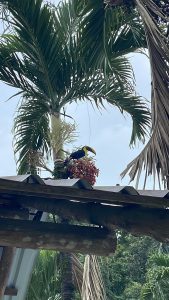
Toucan spotting!
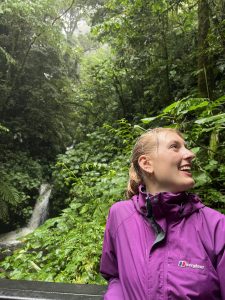
La idea que tenemos de Costa Rica en Europa es algo muy idealizada, un exuberante paraíso verde de biodiversidad en el que la cuestión del cambio climático y la necesidad de abordarlo parecen obvias. Pero ¿es realmente así?
En un país preocupado por las tortugas, me sorprendió cuando vi las pajillas que me dieron en los restaurantes porque me apareció que eran de plástico, pero al ver el embalaje, leí que eran 100% biodegradable. Y con me puso a pensar sobre esta reputación de Costa Rica como defensor del medio ambiente.
Lo que más me sorprendió cuando llegué a San José de Costa Rica fue lo que parecía ser una falta de consideración por el medio ambiente. Hay un montón de basura por todos lados, a pesar de las señales que advierten de las multas que existen al botar basura. Además, no me parece que haya tanta preocupación por reciclar que hay en Europa, muchos ticos no les dan igual reciclar.
Además, al viajar por el país vi el problema del turismo en cuanto a la basura que generan los turistas, y su falta de preocupación sobre el impacto que tiene esta basura en el medio ambiente de este país.
Es preocupante que el nuevo presidente del país haya expresado que está dispuesto a explotar el gas natural en el país, volviendo a la explotación de combustibles fósiles.
Por eso, con todas estas contradicciones decidí averiguar los datos sobre Costa Rica y el medioambiente.
Primero, Costa Rica genera casi todo de su energía de fuentes renovables, y ha sido así desde 2014. Sin embargo, lo que más destaca a mí son esfuerzos hacia la reforestación y la protección de sus bosques y parques nacionales para proteger a los animales que viven allá pero también para aumentar la cantidad de árboles para limpiar y purificar el aire que respiramos. Hoy en día, Costa Rica es el único país de Latinoamérica que ha revertido la deforestación.
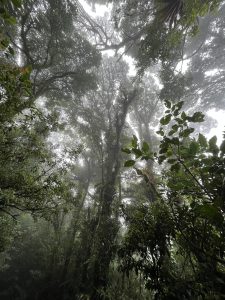
Monteverde cloud forest
Costa Rica tiene casi 6% de la biodiversidad mundial a pesar de su tamaño pequeño, entonces ha asumido un papel vanguardista en la defensa del clima y la biodiversidad que tenemos: el 30×30 initiative, en el que ha asumido el reto de proteger 30% de los ecosistemas del planeta al año 2030. He sido muy afortunada explorar y ver esta biodiversidad durante mis viajes por el país y ver la protección que dan a los parques nacionales, con seguridad afuera. La naturaleza aquí es increíble, y ojalá que puedan conservarla.
Durante mi curso de Historia de Centroamérica con énfasis en Costa Rica, en mi trabajo grupal estamos investigando las diferencias entre las respuestas de Costa Rica y Nicaragua al cambio climático, y aquí es evidente que Costa Rica está haciendo muchos más esfuerzos que Nicaragua con respecto a salvar el planeta, aunque todos los países centroamericanos serán muy afectados por el cambio climático.
¿Me pregunto sí los grandes esfuerzos del país hacia la biodiversidad y la reforestación, han tenido prioridad sobre los pequeños pasos que parecen habituales en europa?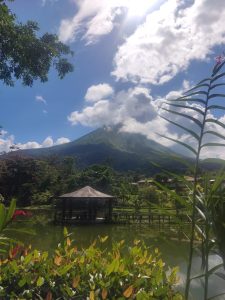
Hasta el proximo.
The image of Costa Rica in Europe is an idealised one, a lush paradise of biodiversity where the issue of climate change and the need to tackle it seems obvious. But is this really the case?
In a country worried about saving the turtles, it surprised my when I saw that the straws I was given in restaurants were made of plastic, but upon reading the packaging, I read that they were 100% biodegradable. With this I started to think about Costa Rica’s impressive world-leading reputation as defender of the environment.
The thing that most surprised me when I arrived in San José in Costa Rica was actually what appeared to be a lack of regard for the environment. There is lots of rubbish all over the place, despite the signs that warn about the fines that there are for discarding rubbish and littering in these places. I also noticed that there was not as much concern for recycling as there is back in Europe, many Costa Ricans don’t seem to be bothered about recycling or not.
It’s worry that the new president of the country has expressed that he is willing to exploit the natural gas in the country, going back to an era of fossil fuel exploitation.
So with all these contradictions, I decided to look for some information about Costa Rica and its relationship and efforts towards the environment.
Firstly, Costa Rica generates almost all of its energy from renewable energy sources, and it has been this way since 2014. However, what stands out most to me are their efforts towards reforestation and the protection of their forests and national parks to protect the animals that live there and to increase the number of trees to clean and purify the air we breathe. Costa Rica today is the only Latin American country to have reversed deforestation.
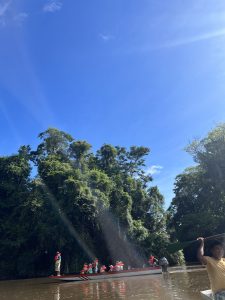
The canals of Tortuguero National Park
Costa Rica has almost 6% of the world’s biodiversity, despite its tiny size so it has taken a leading role in the defense of the climate and the biodiversity that we have in the world today: the 30×30 initiative, it has taken up the challenge to protect 30% of the planet’s ecosystems by 2030. I have been so lucky to explore and see this biodiversity during my travels around the country and see the protection that they have in the national parks, with security. The nature and wildlife here is amazing, and hopefully they can continue to conserve it.
During my History of Central America with emphasis in Costa Rica course, in my group work we are investigating the differences between the responses of Costa Rica and Nicaragua towards climate change, and here it is evident that Costa Rica is making a much bigger effort than Nicaragua towards saving the planet, although all Central American countries will be severely affected by climate change.
I wonder if the big efforts the country has taken towards protecting the biodiversity and reforestation have taken priority over the little steps that seem commonplace in Europe?
Until next time!
